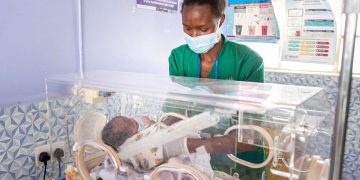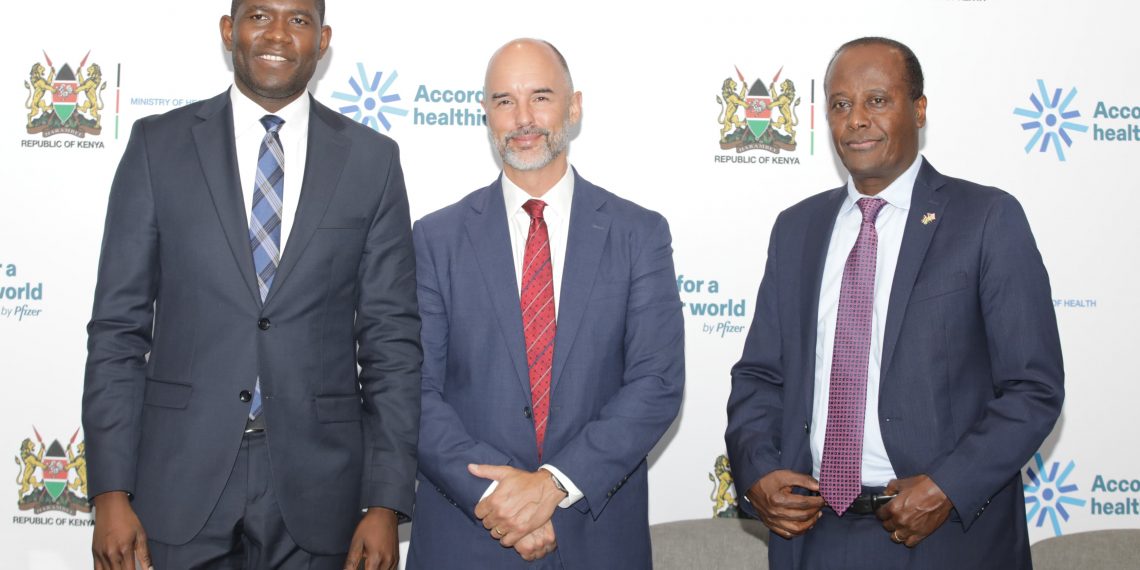Kenya has officially joined Pfizer’s Accord for a Healthier World, a global initiative aimed at expanding affordable access to innovative medicines and vaccines in low- and middle-income countries.
The announcement was made in Nairobi during a high-level event presided over by the Principal Secretary for Medical Services, Dr. Ouma Oluga.
The partnership between the Ministry of Health and Pfizer marks a significant step in actualizing Kenya’s Universal Health Coverage (UHC) ambitions under the Bottom-up Economic Transformation Agenda (BETA). It also reaffirms the government’s commitment to ensuring that quality medical products, vaccines, and technologies are not just available—but accessible and affordable for all, especially the underserved.
“On behalf of the Ministry of Health, I extend our sincere gratitude to Pfizer for their support in strengthening health systems and increasing access to essential medicines,” said Dr. Oluga.
The Accord for a Healthier World is a Pfizer-led initiative that seeks to close the global health equity gap by offering patented and off-patent medicines and vaccines to low- and middle-income countries on a not-for-profit basis. Kenya joins several other countries already benefiting from this program, which also includes capacity-building components in supply chain, health workforce, and data use
Through the Accord, Pfizer will provide its full portfolio of medicines and vaccines—where it holds global rights—on a not-for-profit basis to Kenya’s public health system. This includes access to treatments for infectious diseases, cancer, and non-communicable diseases that have long remained out of reach for many Kenyans due to high costs or delayed market availability.
“The initiative has the potential to drastically reduce the time it takes for new and innovative treatments to reach our patients. Diseases like cancer, inflammatory and rare diseases—where time is of the essence—can now be addressed faster, with better outcomes,” noted Dr. Oluga.
Healthcare experts say this could help bridge the “health equity gap” between low-income and high-income countries, particularly for breakthrough therapies that previously were only accessible to patients in the developed world.
But the Accord is about more than just drugs. A core pillar of the collaboration is health systems strengthening—particularly workforce development and supply chain resilience.
Pfizer will work closely with the Kenya Medical Supplies Authority (KEMSA) to improve systems in demand forecasting, product traceability, and cold chain logistics, among others. These are critical pain points that have historically disrupted access to medicines in Kenya’s public health system.
Moreover, the Ministry plans to leverage Pfizer’s educational platforms and global expert networks to upskill local healthcare workers. Training will focus on enhancing cancer care, antimicrobial stewardship, and integration of adult vaccines in HIV care, particularly around pneumococcal conjugate vaccines like PCV-20.
“This is a chance to not only address unmet medical needs but also empower our health workforce with modern tools, knowledge, and expertise,” said Dr. Oluga.
He added that the collaboration would also help decentralize specialist care to Level 5 and 6 hospitals, improving cancer outcomes in the counties.
As part of the collaboration, the Ministry will work alongside the National Cancer Institute of Kenya and the National Cancer Control Program to generate Real World Evidence (RWE) in oncology. This data-driven approach is expected to guide better policy and investment decisions in cancer control.
Some of the initial target areas include breast and lung cancer care at select Centres of Excellence. The partnership will also explore opportunities to improve the entire cascade of care—from screening and diagnostics to treatment—across these centres.
With this move, Kenya positions itself as a potential regional leader in equitable access to healthcare innovations. It also underscores a growing trend of public-private partnerships aimed at achieving health goals that governments alone cannot fully address.
“This initiative is not just a national milestone—it sets Kenya on a path to become a continental benchmark for timely and equitable healthcare access,” Dr. Oluga said.
As Kenya deepens its collaboration with Pfizer, the Accord is expected to become a cornerstone in the country’s journey toward a more inclusive, resilient, and patient-centered health system.
“I express my deepest appreciation to Pfizer for their unwavering support,” Dr. Oluga said,“By ensuring that essential medical products reach those who need them most, we are contributing to a healthier, more prosperous future for all Kenyans.”














